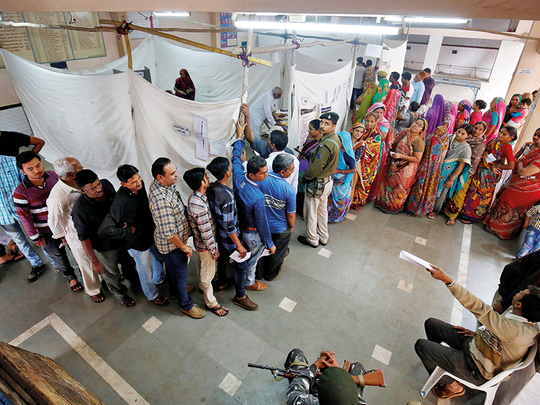
New Delhi: Gujarat is being seen as a make or break state for both the Bharatiya Janata Party and the Congress. The assembly elections in the state have drawn so much attention that it is being called the mother of all battles and the semi-finals to the 2019 general elections.
Since it is the home state of Prime Minister Narendra Modi and BJP president Amit Shah, winning the polls has become a prestige issue for the ruling party. Another factor crucial to the BJP is that it has been serving the state for a long time and would like to keep it that way. Whereas for the Congress party, it is a do-or-die situation, as political forecasters are waiting to judge Rahul Gandhi’s leadership abilities on the basis of the Gujarat election results.
After 2014, Congress has been persistently called directionless and in need of a political strategy. For the party’s good, Rahul, the man who everyone, including his own party, gave up on, has taken hold of himself. No more reluctant to lead the party, his involvement with the Gujarat campaign has brought life to the elections. So, where the BJP anticipated a walkover, the road has become somewhat bumpy.
Political analyst Harish Shah said, “Going by the reception Rahul has got in Gujarat, it’s the first time in the last two decades that Congress has seen some hope. Still, it is difficult to say that BJP will lose the elections. It may not win by a significant margin.”
Election surveys conducted by agencies few months ago had predicted a landslide win for the BJP. Since 2002, the entire politics of Gujarat revolved around Modi, as there was no other mass leader either in the BJP or in opposition to replace him. But now, the same agencies have announced a competition — with the Congress having managed to turn the tide around after spending 22 years in the Opposition.
While news headlines suggested panic in the BJP over the likely outcome, Modi embarked on a campaign blitzkrieg. Political experts say that if the BJP wins, it will be because of Modi’s personal popularity as a prime minister from Gujarat. Though there’s no denying that Gujarat’s growth record appears impressive when compared to other states, the influential Patidar community, comprising farmers, diamond merchants and industrialists, who have supported the BJP for the last two decades, is upset over being denied reservation in jobs and education.
As political analyst Achyut Yagnik stated: “The vote of the Patidar community is quite significant in these elections. But there’s an oddity within the community that while the older generation might vote for the BJP, the younger generation may not. That’s because growth in Gujarat is a jobless growth and there’s discontentment among the younger generation.”
Quick to take advantage, the Congress has promised Patidars a quota and farm loan waiver. In addition, the party has made development, or rather the lack of it, one of its main issues. The Congress has tended to not only focus on anti-incumbency, but also brought together disparate castes groups.
However, Modi has time-and-again reiterated that caste-based politics has no space in Gujarat. But the negative effects of demonetisation of high value currencies and the roll out of the goods and services tax (GST) could affect the Modi magic, particularly in rural areas. The urban centres are, nevertheless, largely with the BJP, which needs to realise it can no more take Gujarat for granted.












